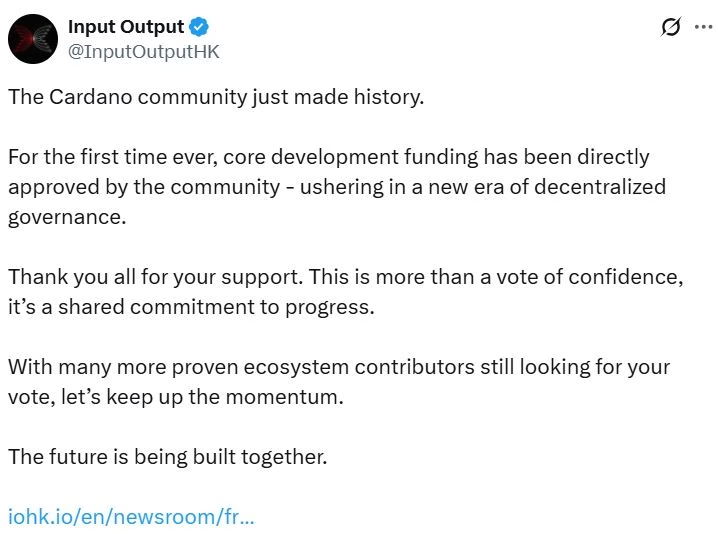Cardano’s core development team received approval to be paid 96 million ADA from the treasury to forge ahead with proposed upgrades to the network.
Input Output Global (IOG) — Cardano’s main development team — submitted the proposal for the equivalent of $71 million in Cardano (ADA), which passed with 74% in favor, representing 200 votes, with six against and seven abstaining, according to the governance action.
The 12-month development plan focuses on improving scalability, the developer experience and interoperability.
Still, it drew some concern from the community over costs, overall accountability and transparency.
Upgrade includes faster transactions, better onboarding
Funding will be milestone-based, with Cardano member-based organization Intersect acting as an independent administrator.
Payments will be released as upgrades are delivered, with other oversight via smart contracts and a dedicated committee, according to IOG.
IOG must publish monthly updates, engineering timesheets and quarterly budget breakdowns.
Some of the key projects in the IOG proposal include Hydra, a protocol for fast, low-cost transactions, and Project Acropolis, a modular re-architecture of the Cardano node for greater flexibility and easier onboarding of new core developers.
Cardano’s average transaction cost is currently 0.34 ADA, according to blockchain research firm Messari, with an average of 20 seconds per block.
In addition, IOG is looking to lower RAM usage and reduce operational costs for stake pool operators through performance optimizations and to implement technical foundations for more advanced smart contracts and seamless interoperability.
Cardano community voices concerns about costs, transparency
Tim Harrison, the vice president of community and ecosystem at IOG, said in a statement on Saturday that this was the first time the community had directly authorized core development funding for Cardano.
Prior to the vote, some community members voiced concerns about the funding cost, transparency around how the teams would be used, how the funds would be spent and accountability for delivering what was promised.
Some also questioned whether the proposal should be broken down into smaller goals with separate budgets requiring individual votes on each item.
Related: Hoskinson promises audit, is ‘deeply hurt’ by $600M Cardano treasury claims
There was a competing proposal from Cardano’s Technical Steering Committee (TSC), which was ultimately…
Click Here to Read the Full Original Article at Cointelegraph.com News…
